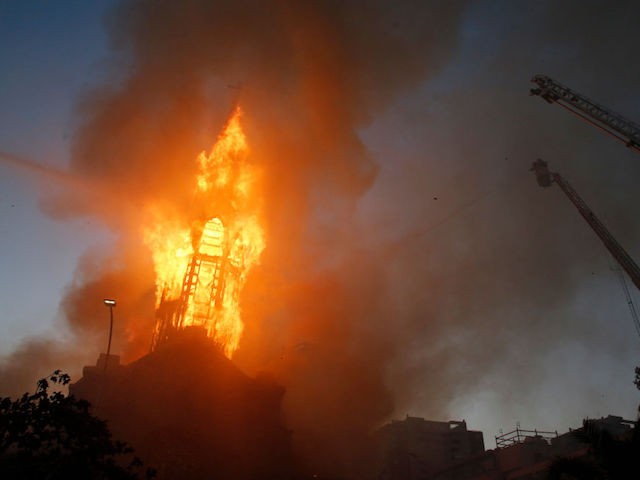Argentina Moves to Protect Itself from Leftist Violence as Javier Milei Reforms Economy
The administration of Argentine President Javier
Milei announced a series of security measures on Thursday meant to
combat roadblocks and other disruptive measures potentially adopted by
union leaders and other leftists in the country to protest the
conservative government. Listen To Story
Patricia Bullrich – Milei’s onetime presidential rival, now serving as Argentina’s minister of security –promised in remarks to the public that law enforcement would use “force proportional to resistance” against anyone attempting to erect roadblocks or otherwise disrupt the daily lives of Argentines and ensure that any criminal actions be prosecuted to the full extent of the law.
“The law cannot be abided by halfway – you either do or you don’t,” she said.
The warning to leftist opposition of the government appears to be a preemptive move in light of the recent history of Latin America, in which nearly every country surrounding Argentina has experienced deadly leftist riots in response to perceived right-wing government initiatives since at least 2019. Chile, Colombia, Bolivia, Peru, and Ecuador all experienced waves of violence in their major cities – featuring the burning down of churches, assaults on police stations, and other disruptive activity in the last five years under center-right or conservative governments. Police addressing several of the riots found evidence of the involvement of the socialist Venezuelan regime and communist Cuba in the riots, as well as other narco-terrorist organizations in the region.
SANTIAGO, CHILE – OCTOBER 18: La Asuncion church burns during a protest on October 18, 2020, in Santiago, Chile. (Marcelo Hernandez/Getty Images)
Leftist organizers in Argentina have already announced plans to organize protests against Milei’s nascent government on December 19 and 20. Milei is a hardline libertarian – the first in the nation’s history elected president – and a strident critic of socialism, earning the disgust of much of the country’s left. In his first week in office, he announced a dramatic reduction in the size of the federal government, cutting the number of cabinet-level ministries from 18 to nine. Economy Minister Luis Caputo introduced a separate series of reforms that eliminated several socialist government subsidies on fuel, electricity, and transportation and ended federal-level public works projects.
“The question is, what do I do? [If they throw stones], I put them in jail, because the people will not lack assistance, but I get rid of the middlemen, the thieves, I get rid of those who use this to ruin the lives of good Argentines,” Milei told La Nación, a major Argentine news network.
“Let them come and take me out,” Milei continued. “They are going to have to take me out of there dead. They are not getting me out of there. I am going to fight that fight.”
The Milei administration also introduced an abrupt devaluation of the Argentine peso, from 366 pesos to the U.S. dollar down to 800 pesos per dollar. The administration of predecessor Alberto Fernández, an establishment leftist, had kept the peso’s value artificially inflated, which forced Argentines to do commerce with several confusing exchange rates in an attempt to adhere to the real-world value of the peso. Milei promised on the presidential campaign trail to introduce the U.S. dollar as an official currency in Argentina to address the dwindling value of the peso.
Bullrich announced the measures to address potential leftist protests on Thursday morning, alluding to Milei’s commonly used phrase “Within the law, everything and outside of the law, nothing.”
“The purpose of the protocol is, on the one hand, abiding by the law — as the president says, ‘Do the crime, do the time,'” Bullrich explained, “and on the other hand is to take care of those who take care of us,” she added, referring to law enforcement.
“The four federal forces, plus the federal penitentiary service which has become a part of this ministry, will intervene in the face of roadblocks … partial or total,” she explained. “To institute these measures, the forces will employ the minimum force necessary and sufficient and will be proportional to resistance.”
She warned that all those blocking, transporting, organizing, and financing would be criminally implicated if engaging in disruptive activity, and those bringing children would also face legal consequences: “We will not allow anyone to use children as shields.”
Bullrich also said the federal government would bill the organizations responsible if law enforcement and security measures were necessary in response to a disruptive assembly.
The Argentine news outlet Infobae noted that Bullrich made a similar announcement of security measures during her first term as minister of security under former President Mauricio Macri, who governed from 2015 to 2019. Macri was the one interruption in a string of leftist governments in Argentina from 2003 to 2023. He ultimately endorsed Milei in the 2023 election after Milei defeated Bullrich, his preferred candidate, in the first round of voting on October 22. Infobae recalled that the measures announced under Macri went “unused.”
Leftist leaders grumbled to the Argentine newspaper Clarín on December 10 that Macri’s warnings as a candidate and during his inauguration that he would not tolerate blockades or violence was “repressive and intolerant” and that Milei himself was a “repressive person.”
The leaders of two major labor organizations, the Workers’ Party and Barrio de Pie (“Neighborhood on Its Feet”) announced it would protest Milei on December 19 and 20, organizing socialist “mobilizations” to express their displeasure with the first two weeks of Milei’s administration.
Argentina is living through its worst economic crisis in modern history, the result of years of socialist policies. Inflation as of this week neared 150 percent and the nation’s poverty and joblessness rates were skyrocketing. Fernández, the former president, attempted to address these challenges by seeking aid from communist China, Russia, and other rogue regimes, a policy Milei abruptly halted.
Follow Frances Martel on Facebook and Twitter.
Source: Breitbart







